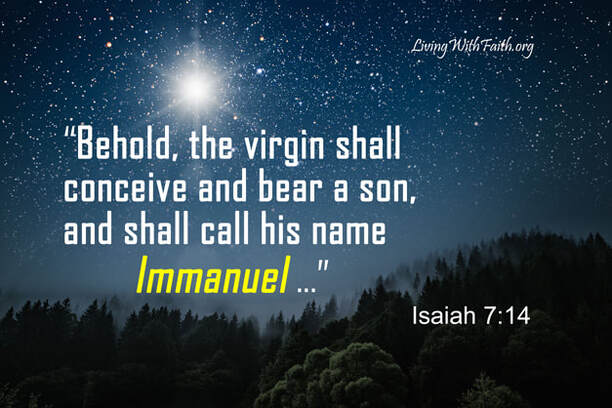There have been endless arguments between Christians and non-Christians through history as to whether the Hebrew word betulah in this verse – translated “virgin” in most English Bibles – should actually be translated “virgin” or just “young woman.” Non-believers have also argued that the son promised by Isaiah was simply the Jewish king Hezekiah. Conservative Christians feel there is ample evidence to show that the translation “virgin” is correct, and that the meaning of Immanuel – “God with us” – as well as the context of the promise could hardly be applied to Hezekiah.
But in this blog post we will go beyond those questions to focus on what the verse says and to look at its wider setting in the book of Isaiah. When we read Isaiah’s prophecy of the Immanuel to come, we may focus on the virgin birth of the child or the meaning of his name – but that is only half of the significance of this great verse. The incredible promise of “God with us” made in this verse is coupled, if we think about it, with the equally astounding prediction of Immanuel’s humanity. God could have dwelt with humanity in the form of some kind of spirit being – to teach his ways – but the words “the virgin shall conceive and bear a son” show the humanity of the Immanuel as much as his name shows his divinity.
This duality of the fully human and fully divine Immanuel is stated again a few chapters later when Isaiah takes up the theme of the promised child again:
“For to us a child is born, to us a son is given; and the government shall be upon his shoulder, and his name shall be called Wonderful Counselor, Mighty God, Everlasting Father, Prince of Peace” (Isaiah 9:6).
The promised One’s humanity is seen in “for to us a child is born” with the emphasis on his human birth contrasted with “to us a son is given” signifying a non-human origin that is made clear in the titles that follow. Interestingly, the four titles are equally indicative of the human and divine with “Wonderful Counselor” and “Prince of Peace” being essentially human titles and “Mighty God” and “Everlasting Father” being obviously titles that could only apply to God.
So, beyond its prediction of the virgin birth, the Immanuel promise of Isaiah stresses both the humanity and divinity of the One who was to come – a fact stressed equally in New Testament scriptures such as the transcendent opening verses of the Gospel of John:
“In the beginning was the Word, and the Word was with God, and the Word was God … And the Word became flesh and dwelt among us, and we have seen his glory, glory as of the only Son from the Father, full of grace and truth” (John 1:1, 14).
The statements that “the Word was God” and “the Word became flesh” are equally important in showing the Immanuel promise was fulfilled in the person of Jesus Christ. Luke’s Gospel confirms the duality in the same way:
“He will be great and will be called the Son of the Most High. The Lord God will give him the throne of his father David, and he will reign over Jacob’s descendants forever; his kingdom will never end.” (Luke 1:32–33).
Once again, the words “Son of the Most High” and “his father David” proclaim the unique and unmistakable roles of the Immanuel – the promised one who would be born divine and human, equally God and man, and who would eternally bring the two together.

 RSS Feed
RSS Feed
